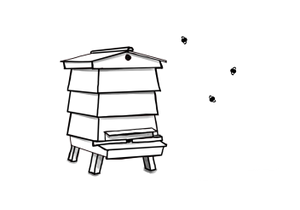Q: How do you view bees?
A: Bees themselves are sustainable and very much embedded in a chain of life.
Bees collect nectar whilst pollinating flowers
the flowers produce fruit and seeds
the fruit and seeds are eaten by birds
the birds poop the seeds with fertiliser
the seeds grow into plants
plants produce flowers
the bees collect nectar and pollinating flowers
If you take away bees and pollinators, most of the life on land will fail. By keeping bees I believe we are promoting one of the major chains of life. Take away humans and it will flourish. What does this say?!?
Within the cycle of life revolving around bees, nothing is ever wasted. In the height of summer, 1000 bees per hive may die per day. However, they become food for birds, or compost to fertilise more plants. Any litter the bees produce is collected by bumblebees and ants, or composts. There is no waste.
Similarly in terms of our beehives, the honey we collect is simply excess honey that bees do not need. The honey is made into whisky or eaten. The wax can be made into beauty products, polish, candles etc. Anything left can be composted. There is no waste. Any money collected from honey sales is rolled back into the business to keep more bees. I choose not to make a profit.
Q: Where did your passion for bees stem from?
A: I started keeping bees for environmental reasons. The honey is just a bonus.
I was driven by my desire to give something back to the planet (if only everyone would!).

Q: How often do you think about your bees?
A: Very often. A lot of people talk to me about bees, and I try and share interesting facts into the conversation that they have never heard before.
I see fields or gardens with flowers, I think 'the bees would like that', and whatever the weather I wonder what the bees would be doing.
I am also thinking about my next visit.
Q: How much time do you dedicate to your bees?
A: A fair amount, but my busiest months are in spring when I need to give the bees space due to the rapid growth of the hive, and perform controlled swarms that prevent the bees from finding new homes elsewhere in unwanted locations. Also late summer and early autumn harvesting honey takes up alot of my time. I have to remove excess space to help them keep warm over the cold months of winter, and to make sure they are healthy, and have enough food for winter. I have dedicated myself to not just understanding 'how' so much, but 'why' in terms of how my bees act. I quickly learnt how to predict their behaviour based on genetic trends, the time of year, the weather and even looking at their behaviour on the outside of the hive.
Q: How do you think people can give back to the community/the world via Bees?
A: The easiest way people can help bees and pollinators is to plant flowers that are helpful to bees. During summer, flowers are plentiful. The very early flowers such as snowdrops and crocuses are very valuable for bees as the pollen promotes a fast and early growth of the hive. Farmers can also leave a wild strip around fields, or reserve space for pollinators. They can allow beekeepers to keep bees in the corner of a field that has no farming use.
Q: How do you think bees can bring people together?
A: Community apiaries are becoming more popular, and many beekeeping forums exist to help one another. Gardeners also like to involve themselves with bees, and talks are held at various clubs.
Q: How do you try to be as sustainable as you can in terms of your beehives and their honey?
A: Everything involved in the keeping of my bees involves being as eco friendly as possible. For example, the honey buckets I use can be recycled (if given back) to be reused, or used for other purposes.
The least sustainable parts (which we probably shouldn't mention) are:-
I use high density polystyrene hives. However, the benefit they have for the bees, and they should be good for 30 years, the benefit dissolves the carbon footprint.
I use a beekeeping 4x4 to get about - most of the hives are far offroad, and is a tool of the trade.
I sometimes need to warm the honey if it is not collected promptly; however, normally I try and only collect it in June to September.
Q: How do you make sure that you do not exploit your bees?
A: Most certainly. I leave some summer honey for the early autumn period, and perform all harvesting by the first or second week of September.
The rest is theirs. Autumn honey is high in glucose. It is designed as a fuel for the bees to use to keep warm over winter.
In Autumn, I monitor the weather, and make sure they have enough food. An average beehive will consume approximately 3Kg of honey per month over winter.
I plan an average hive to keep at least 15Kg of honey for winter. If the Autumn weather is not so good, and is too wet, too cold or too dry, I may supplement their food to make sure they have enough.
Making sure they do not have too much is also important.
If they have too much, and we have a late warm spell, they may swarm because the bees do not have enough room to lay eggs. This is a disaster for the bees that swarm, and the bees that are left behind. They will all die.

